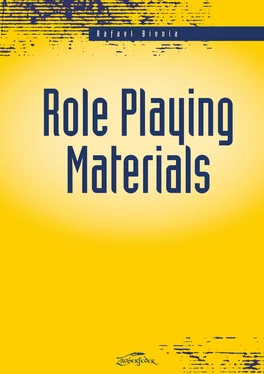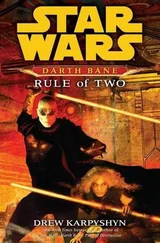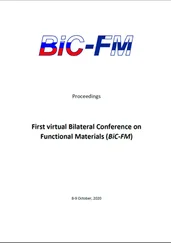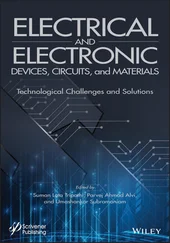The change happened sometimes automatically during a game session, when my participant perspective moved to the perspective of researcher and to the character that I played. In this regard, becoming aware of the different perspectives of participant observation was the first step in solving the epistemological problem, how to know about role playing (see Chapter 1). Moving between participating and observing roles generated a creative tension: “ Participant observation is a paradox because the ethnographers seek to understand the native’s viewpoint, but NOT ‘go native’” (emphasis in original, DeWalt & DeWalt, 2002, p. 263). As I moved to the position of observing researcher, I went alien to the role of participant and character that I was familiar with before.
Steering three roles: Researcher, participant in a game, character in the game .With the three options, I could write about processes from several perspectives. The problem was how to control the three roles. The challenge of studying role-playing games is not only to reflect about the ethnographer role-playing field-work perspectives, but at the same time reflecting how a researcher is a participant in a role-playing game and a character in the story world at the same time.
Participation in role playing requires the researcher not only to play her or his role as participant, but also to some degree that of an observer, and above all the role of the character within the game. The reason why switching roles has to be taken care of is because during role playing, the challenge for the researcher is to avoid disturbance, as this breaks the players’ goal to maintain the illusion of a fictional world. Players are sensitive to elements that do not belong to the game world, which requires the researcher to take the role of the complete participant. In this case, starting from an informed position is helpful for studying role-playing games.
During my field work, participating in a role-playing game session became difficult. First, I had to role-play the character in the game. Second, I had to take different field-work perspectives. The researcher as participant role-plays the character and maintains opportunities for observation while changing field-work perspectives as necessary.
Actor-network theory integrates the researcher as an actor in a game network and encourages examining the process of changing perspectives, because it considers the third role of a participatory observant researcher. Beside changes in role-playing practices, subjectivity is one obstacle during field work which I share with other researchers on games employing participant observation (Pearce & Artemesia, 2009; Taylor, 2006). In her study of online role playing, Copier reflects upon her researcher position by drawing on actor-network theory in general and Haraway in particular. Copier (2007) reflects herself as participant and researcher to “express situatedness in writing” (p. 30). In studying role playing, however, I found traces for three roles: researcher, participant, and character. Playing a character leaves traces for a third perspective. Observations from a character’s perspective differed from those of me being a researcher and a participant. Furthermore, I distinguished the role of the participating self who was familiar with role playing from the researcher. As a researcher I had to go alien, because I needed to look at different phenomena than those I observed from the character perspective during role playing, or those that I observed from the participant or player perspective. Taking the perspective of researcher, participant in a game, and playing a role in the role-playing game, resulted in a triple role-playing practice. Changing the perspectives during a game session allowed me to select different observations.
To remain in control of three roles, I drew upon role playing as a practice itself. In ethnography, role playing does not refer to the meaning of the word as a recreational practice, but to playing with perspectives. I draw upon the reflections of role players to inform ethnographic role playing. In their text for a Nordic larp conference book, Montola, Stenros, and Saitta (2015) describe the process of changing roles with regard to situations as steering. “Steering is the process in which a player influences the behavior of her character for non-diegetic reasons” (p. 108). Non-diegetic reasons are reasons not linked to the narrative elements that construct the story world, but relate to elements that players consider not part of the game, such as physical safety. In this case, players might not run “in the pitch-black forest even when [their] pursuers do” (Montola et al., 2015, p. 110). The decision when to steer depends on context. It might be the case that players ignore physical safety to some extent and run through a dark forest, as I did in the introductory example of the fleeing wizard. As their text informs other role players, it focuses on the “dual consciousness” of players who steer their roles as participant and character. I add here the researcher as a third “consciousness” or perspective. Thus, controlling three perspectives adds to diegetic and non-diegetic reasons of a role player those reasons important for doing research. By using role playing as an ethnographic method to control field-work perspectives, my practice and understanding of role playing changed.
I have observed that the difficulty of steering three different roles resulted in a change of my personal role-playing style. I would not have observed this change if I had not been familiar with role playing before. My personal style changed because I had to distribute play time between participating, playing a character, and doing research. When I observed this change, I alienated my style further. For example, when I began this study in 2011, I stopped making costumes for larp and relied more and more on less time-consuming practices, such as recycling previous costumes, or borrowing costumes from friends, or buying costume parts instead of making them myself. In 2012 and 2014, I ran tabletop role-playing games with less effort than I used to invest. I intensified my participation in several role-playing games and groups in the beginning of my field work in 2011 and 2012, and withdrew from 2013 until 2015 almost completely—returning only when in need of further clarification and verification of conclusions. 5Moving outside my comfort zone became a point of self-reflection. This alienation caused a tension with my personal style that was about doing costumes myself. The inner reluctance to alienate my play style invigorated my reflections on the inter-relational demands, the seduction, and coercion of materials I had not been aware of before.
At the beginning of my study for each empirical chapter, I took an informed position to alienate what I took for granted about role playing. Taking different perspectives, oscillating between participating and observing, I produced different types of written field notes. Everything that seemed familiar or unproblematic became the source of inquiry. The question was how I came to know about an aspect and what material traces were there. Steering helped to control different roles, reflect upon changes in observation and participation, and develop sensibility for the actor that I followed for every chapter.
Participation per chapter .For Chapter 3, I followed the material actor costume to larps that took place at a former military area in Bexbach, Germany from 2010 until 2012. The former military area has been turned into a larp area and renamed Utopion. At Utopion, I focused on two larp campaigns and a fest larp that took place there. A larp campaign is a series of usually annual larp events that continue a longer narrative. The two larp campaigns were Alcyon (Fantasiewelten e.V.) and Dunkle Pfade (Nachtfalken Orga). Both larps involved around 150 participants. Fest larps are larger in scale, ranging from 1,300 participants at Epic Empires to 8,500 participants at Conquest of Mythodea . I chose Epic Empires (Epic Empires Event UG), because it took place at Utopion and involved organizers and participants of the two larp campaigns. Beside these larps, I took part in other larps. Some differed from my selection, as they drew upon a different genre than fantasy, took less time, or were played in other parts of Germany and Europe. Field notes included data samples differing in size and medium: hand-written narratives of what happened during the day, quick notes written during gameplay in a small notebook that I carried with me, and photographs of costumes, props, and locations. From the perspective of observer as participant, I wrote these notes in the evening in my tent and when the larp was over on Sunday. After the larp, I used the photographs to distance myself and describe scenes from a complete observer perspective. The photographs and the quickly written notes were from the perspective of complete participant, sometimes using the voice of my characters.
Читать дальше












